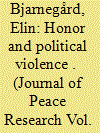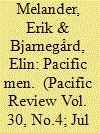|
|
|
Sort Order |
|
|
|
Items / Page
|
|
|
|
|
|
|
| Srl | Item |
| 1 |
ID:
193647


|
|
|
|
|
| Summary/Abstract |
What is the relationship between armed violence and patriarchal values? This question is addressed with the help of a survey of young men in the conflict-affected southern provinces of Thailand. In Study 1 we find that men with more patriarchal values are more prone to volunteer for paramilitary service. Study 2 uses a natural experiment made possible by the conscription lottery in Thailand to compare survey responses of men who were involuntarily enlisted to do Military Conscription Service (treatment group) with the responses of men who participated in the lottery but were not enlisted (control group). We find no difference between the treatment and control groups in patriarchal values. We conclude that patriarchal values drive voluntary participation in armed conflict, whereas military service as a conscript in a conflict zone does not cause patriarchal values.
|
|
|
|
|
|
|
|
|
|
|
|
|
|
|
|
| 2 |
ID:
156656


|
|
|
|
|
| Summary/Abstract |
Who participates in political violence? In this study, we investigate the issue at the micro-level, comparing individuals who have used violence in political uprisings with those who have not. We develop our argument from the observation that men are strongly overrepresented in political violence, although most men do not participate. Literature on masculinities emphasizes the role of honor and its links to different forms of violence, such as domestic abuse, criminal violence, and violent attitudes. Building on this literature, we discern two separate but related aspects of honor: honor as male societal privilege and control over female sexuality, that is, patriarchal values, and honor as ideals of masculine toughness, that is, the perceived necessity for men to be fierce and respond to affronts with violence or threats of violence in order to preserve status. We argue that patriarchal values combined with ideals of masculine toughness together constitute honor ideology, which contributes in turn to the explanation of who participates in political violence. We present new and unique individual-level survey data on these issues, collected in Thailand. We find that honor ideology strongly and robustly predicts a higher likelihood of participating in political violence among male political activists. A number of previous studies found a macro-level relationship between gender equality and peacefulness in a society. This study provides evidence for one micro-level mechanism linking gender equality and political violence at the macro level. Based on these results, we conclude that honor ideology endorsement is a driver of violence in political conflicts.
|
|
|
|
|
|
|
|
|
|
|
|
|
|
|
|
| 3 |
ID:
153243


|
|
|
|
|
| Summary/Abstract |
The gender gap in attitudes to foreign policy is well established in public opinion literature. Studies have repeatedly reported that women tend to be more peaceful and less militaristic than men. This article reexamines attitudes of individuals in relation to foreign policy and pits the gender gap against the largely forgotten feminist gap. We argue that the individual-level relationship between gender equality attitudes on the one hand, and tolerance and benevolence on the other, is under-researched, but also that key contributions about the effects of feminism have been mostly ignored in research on the gender gap in public opinion. We return to the notion of a causal relationship between gender equality attitudes, and peaceful attitudes, and of a feminist gap that also exists among men. In a series of novel empirical tests, we demonstrate that attitudes to gender equality, not biological sex, explain attitudes towards other nationalities and religious groups. Using individual-level survey data from five countries around the Pacific: China, Indonesia, Japan, South Korea, and the United States of America, we show that both men and women who reject gender equality are much more hostile both to other nations and to minorities in their own country.
|
|
|
|
|
|
|
|
|
|
|
|
|
|
|
|
|
|
|
|
|